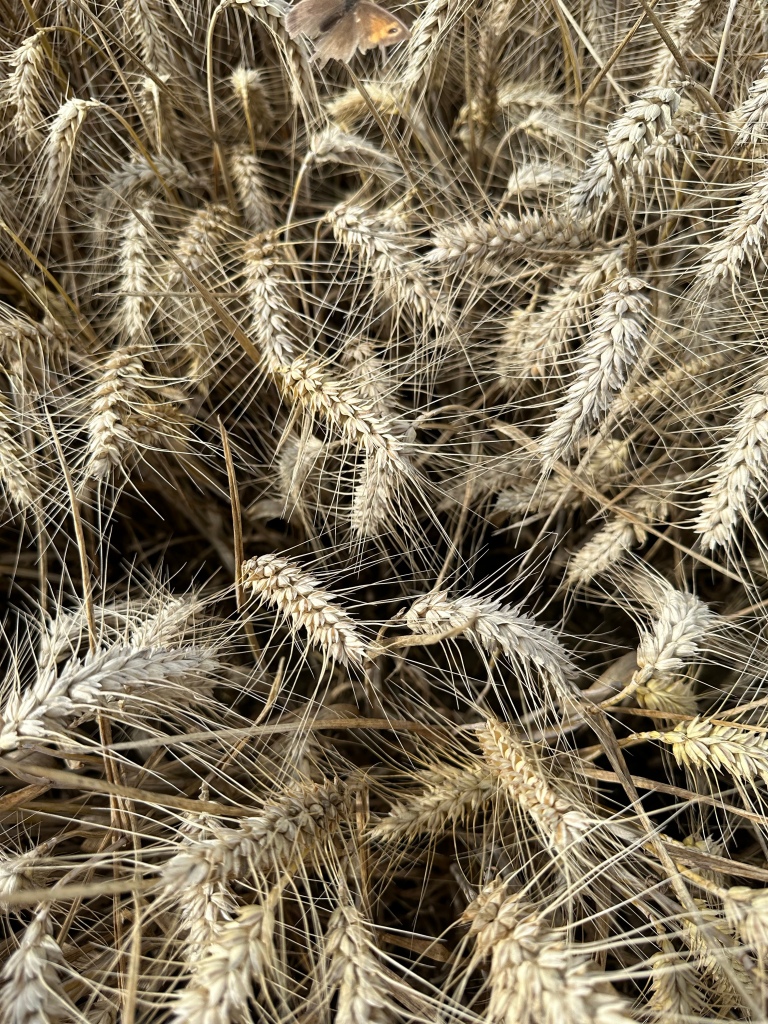WHITE FIELD IN BARLEY
Here in my August days,
at the top of White Field
I open my hand; I spread
my fingers and I palm
the barley heads all down
the slope to the lane below.
She leaves Keeper’s Lodge
at 4.00 in the morning.
Dew on the nettles.
The sun a silent partner
to the pale full moon.
An owl calls once
in the willow as the dark
gives way to the pearl
before dawn. In one hour
up at the big house
she will be kneeling on
the kitchen flags with
her bucket and its cloth.
She must clear the black
grease beneath the spit
before Mr. Howarth stands
in the doorway legs apart
picking his teeth. He’ll
be silent, but he will
judge. All she cares is
that she is done and
on her feet for when
the ostler and his boy
Simon are in to break
their fast. Simon has
eyes like diamonds and
she is sweet on him,
but knows that he shall
go for a soldier as soon
as the harvest is in. So
this time she must speak
or take a broken heart
into the long winter nights.
At the top of White Field
she opens her hand; she
spreads her fingers and
she palms the barley heads
all down the slope to
the lane below.
He hefts the scythe, his
father’s before he died
beneath a thrashing horse.
He has a canvas bag,
an old hole sewn tight
and a new strap secured
made from his grandda’s
belt. Inside a loaf’s end
and cheese in a damp rag
and cider in a stoneware
jar. And a book with words
and pictures and a space
under each to write in.
He’ll join the men and boys
down on the lane by
the meadow gate. He has
a joke ready in his head,
one to cap Old Japhy’s,
ruder, bolder, a tale that
only a man that’s tumbled
a girl in the straw would
dare to tell at noon break.
He blushes in contemplation.
But how much sooner he
would rather curl up under
the hay wain with his book
for to read like a scholar
is a glory just close enough
to wish for in the night.
At the top of White Field
he opens his hand; he
spreads his fingers and
he palms the barley heads
all down the slope to
the lane below.
The Reverend Stollery
stands at the crook of
the dog-leg corner where
the headrow of Cuckoo Field
is folded into a hawthorn
hedge. Tears are hot in
his eyes and in his throat.
He’s seen death in India
and on the veldt and if
the greatest question of all
were to be asked then surely
it should have been under
those alien suns with the
stink of cordite and rot
wrapped around their heads
by day and night. But this
was doubt by stealth, by
surprise in a cottage ripe
with the smell of thatch
and plaster. Maybe it was
Esther’s great abandon
with the baby in her arms,
a grief so visceral that
his heart finally twisted like
a thing sprung from a trap.
Men will kill for an idea, for
bars and colours on a flag.
This they will do and he must
hear their prayers and curses
as they go to join their khaki
pals who’ve gone before. But
now he stands where peewits
and larks fill the August sky
with joy abundant and there’s
the question: What God wants
a child’s soul that knows no
greed or rancour? Jesus and
his sunbeams. Now the sun
mocks light and the Reverend
steps into a darkness deeper
than any night. He might
as well be blind as a stone.
At the top of White Field
he opens his hand; he
spreads his fingers and
he palms the barley heads
all down the slope to
the lane below.
It’s just past midnight.
In Bluey Penfold’s gunny sack
the unsprung teeth of his
rabbit traps chatter. Deep
inside his flapping coat, four
rabbits nestle, spines snapped
like twigs, but warm still.
He can see in the dark like
the cruising owl and his feet
find the spaces in between
the brambles and the tussocks
with the deer’s certainty.
Before the next church bell
each shooshi will be turning,
spit-roasted over the yog
that Ruby’s kept fed since
evening. The chavvies will be
wide awake and crawling out
of the bender. The grais are
out of their harnesses and
on long ropes along the hedge.
The waggon shafts are up,
their ferrules resting on two
props against the moisture
of the dawn. We the foki live
not with you but beside you,
ghosts in motley, trading on
your fear, dark as berries,
speaking the poggado-jib,
but loving, losing, fighting
and dying in our time, just
like you, little do you care.
At the top of White Field
he opens his hand; he
spreads his fingers and
he palms the barley heads
all down the slope to
the lane below.
Here in my August days,
at the top of White Field
I open my hand; I spread
my fingers and I palm
the barley heads all down
the slope to the lane below.
31.07.23

